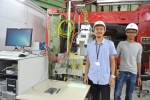Indonesia to Build its First VGOS Radio Telescope, Boosting Astronomy and Beyond
By M. Naufal Hafizh, S.S.
Editor M. Naufal Hafizh, S.S.

Institut Teknologi Bandung (ITB) is set to construct Indonesia's first Very Long Baseline Interferometry (VLBI) Global Observing System (VGOS) radio telescope at the Bosscha Observatory. This strategic development underscores ITB's commitment to advancing science and technology in Indonesia, particularly in the fields of astronomy and related disciplines.
This groundbreaking project, a first for Indonesia, is being carried out in collaboration with the Shanghai Astronomical Observatory-Chinese Academy of Sciences (SHAO-CAS).
This state-of-the-art radio telescope, adhering to international standards, will mark a new era for Indonesian astronomy and open up a wider range of research opportunities. Its versatility extends beyond astronomy, encompassing geodesy, data science, telecommunications, software engineering, and more.
Prof. Dr. Taufiq Hidayat, D.E.A, Head of the ITB Partnership Bureau, explained that this telescope will operate within a network, joining numerous other radio telescopes around the world. Currently, VLBI is primarily concentrated in the northern hemisphere, with limited presence in the equatorial region and ongoing development in some neighboring countries.
The presence of a radio telescope at the equator is crucial, as there is currently only one such station near the equator, located in Brazil. Additionally, Indonesia's position is expected to fill the gap in the equatorial region for the Asia-Oceania VLBI Group for Geodesy and Astrometry (AOV), a subgroup of the International VLBI Service for Astrometry and Geodesy (IVS). The construction of the VGOS radio telescope will enable Indonesia to bridge the baseline between the northern and southern hemispheres, providing an opportunity to contribute to the international radio telescope network and fostering multidisciplinary collaborations in the future.
VGOS is a global network of radio telescopes operating synchronously to observe cosmic radio sources with high precision. By combining data from multiple telescopes scattered across the globe, precise measurements of distances between telescopes can be achieved. One of its applications is to measure continental drift. With this tool, the speed of movement over a specific period and changes in distances between continents can be determined with accuracy. "Thus, we can determine whether a region has dangerous potential or not," he said on Wednesday (July 24, 2024).
In addition to measuring the movement of points on the Earth's surface, this telescope can be used to create a highly accurate reference frame, precise time standards, and monitor the potential for climate change.
The construction of the VGOS radio telescope at the Bosscha Observatory represents a long-term investment for Indonesia in various fields. This telescope will be a valuable asset for education, research, and innovation, further solidifying Indonesia's position on the global astronomical map.

.jpg)
.jpg)
.jpg)
.jpg)
.png)



.jpeg)